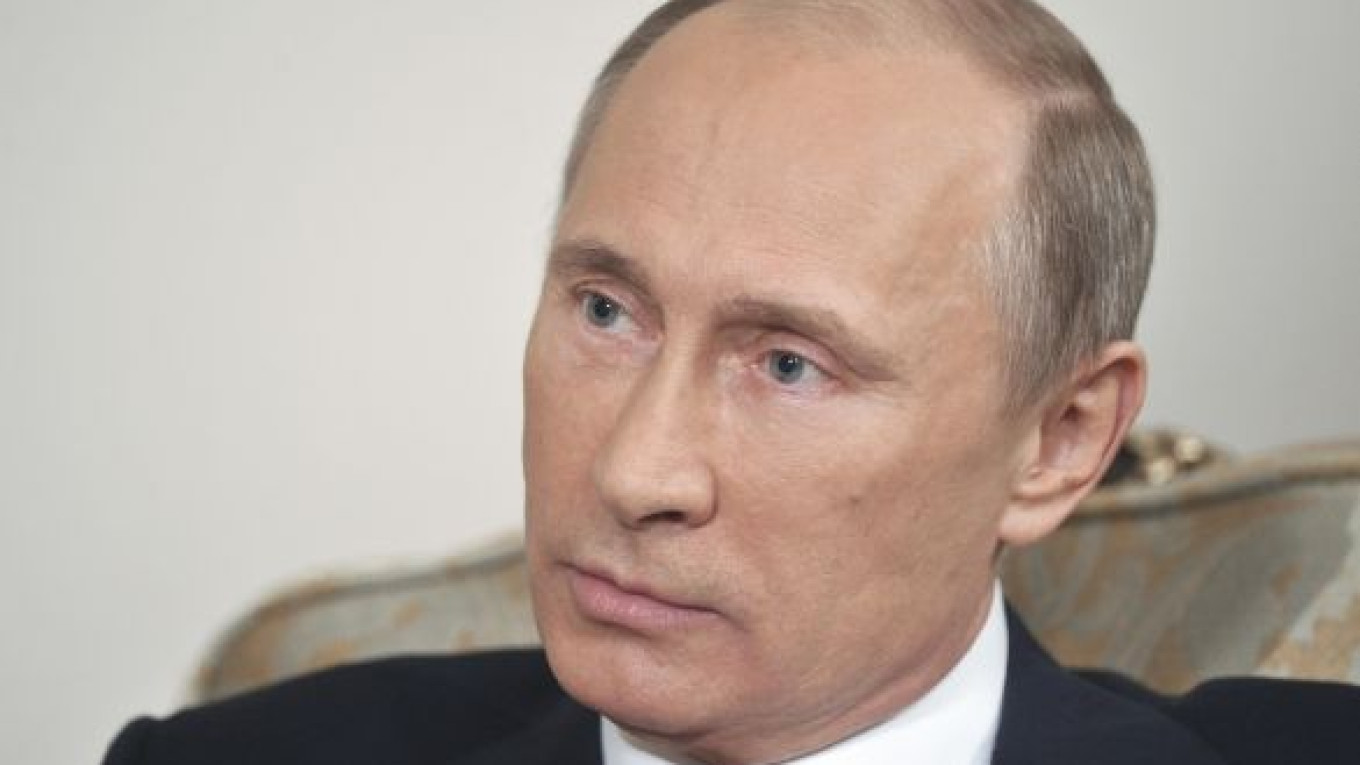NGO representatives on Monday questioned the validity of President Vladimir Putin's comment to German television that NGOs in Russia had received about $1 billion from abroad since the "foreign agent" law was adopted in 2012.
In the interview broadcast Friday, Putin said there were 654 active NGOs in Russia being funded from abroad. That would mean each organization got an average of $382,000 a month. "At the most, our annual funding is half that," said Sergei Nikitin, head of Amnesty International's Moscow office.
Putin made the comment while dismissing criticism of the recent wave of inspections of nongovernmental organizations. "For four months after we adopted the respective law on these organizations' accounts, can you imagine how much money came [to them] from abroad? You can't imagine … 28.3 billion rubles," he told the ARD television channel.
"These are organizations engaged in domestic political activities. Shouldn't our society know who is getting this money and what it is for?" he said, without elaborating. Vedomosti on Monday quoted his spokesman, Dmitry Peskov, as saying the president was citing confidential information obtained by the security services.
"This figure does not correspond to reality at all," said Tanya Lokshina, senior researcher at Human Rights Watch in Moscow. "We only have two researchers and two administrative staff members, one of whom works part-time."
"For this year, we have only received 16,000 euros [$21,000] from the Norwegian Helsinki Committee and 100,000 from the European Commission," said Grigory Melkonyants, deputy director of Golos. "This funding will be spent on concrete projects that will span longer than a year and will not be connected with election monitoring."
Melkonyants was perplexed about where Putin got the $1 billion estimate from.
"It can be that Putin is deliberately being led astray by his advisers, or it is also possible that various pro-government organizations that use offshore funds to finance themselves were included in this figure," said.
Golos, Human Rights Watch and Amnesty International offices have been searched in recent weeks by Russian authorities in what activists say was a centrally organized campaign to stifle dissent.
Speaking at the final news conference that followed Putin's two-day visit to Germany, the head of state said: "We do not have a goal of shutting NGOs down. We just want to keep the financial flows under control."
German Chancellor Angela Merkel had scolded Putin over a Russian crackdown on NGOs, saying Russia's economy needed civil society in addition to its natural resources to prosper.
Human Rights Watch's Lokshina agreed with Putin that the government did not intend to "shut us down. But they want to harass us to the extent we will not be able to carry out our duties as we should."
Nikitin said that if Putin had a list of 654 NGOs that receive foreign funding, it should be made public as the Justice Ministry already collects all this information.
Since a 2006 law, all NGOs have to present their reports to the Justice Ministry every year. These reports are public and can be perused on the ministry's website.
For instance, according to the website, one of Russia's prominent NGOs, the Committee Against Torture, received $1.2 million in foreign funding in 2011.
Reports for Human Rights Watch, Amnesty International and Golos could not be located.
In another streak of government pressure against NGOs on Monday State Duma Deputy Mikhail Starshinov proposed to seize funds from NGOs that do not want to register themselves as "foreign agents."
A Kremlin-backed law approved last year required all NGOs that receive funds from abroad and engage in vaguely defined political activities to register as "foreign agents." Leading Russian NGOs pledged to boycott the bill.
Starshinov called his initiative a "preventive measure," Kommersant reported. The seized funds, according to the deputy, should be collected in a special fund that would then allocate them to child care or to projects to help disabled people.
Nikitin called Starshinov's initiative a "theft," saying groups that transferred money to NGOs could sue the Russian state for seizing their funds.
Lokshina added that the current campaign against NGOs is "unprecedented" and that the main difficulty was not that the government adopts "draconian laws" but that there was a systematic harassment of the NGO community, including threats and intimidation of activists and their family members.
Contact the author at i.nechepurenko@imedia.ru
Related articles:
A Message from The Moscow Times:
Dear readers,
We are facing unprecedented challenges. Russia's Prosecutor General's Office has designated The Moscow Times as an "undesirable" organization, criminalizing our work and putting our staff at risk of prosecution. This follows our earlier unjust labeling as a "foreign agent."
These actions are direct attempts to silence independent journalism in Russia. The authorities claim our work "discredits the decisions of the Russian leadership." We see things differently: we strive to provide accurate, unbiased reporting on Russia.
We, the journalists of The Moscow Times, refuse to be silenced. But to continue our work, we need your help.
Your support, no matter how small, makes a world of difference. If you can, please support us monthly starting from just $2. It's quick to set up, and every contribution makes a significant impact.
By supporting The Moscow Times, you're defending open, independent journalism in the face of repression. Thank you for standing with us.
Remind me later.


